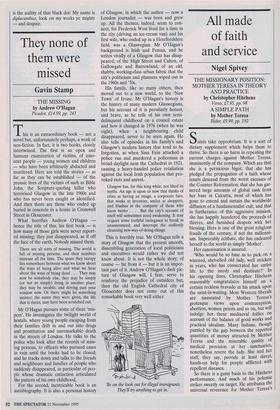They none of them were missed
Gavin Stamp
THE MISSING by Andrew O'Hagan Picador, £14.99, pp. 243 This is an extraordinary book — not a novel but, unfortunately perhaps, a work of non-fiction. In fact, it is two books, closely intertwined. The first is an open and humane examination of victims, of inno- cent people — young women and children — who have been arbitrarily abducted and murdered. Here are told the stories — as far as they can be established — of the prosaic lives of the victims of such as Bible John, the Scripture-quoting killer who terrorised Glasgow in the late 1960s and who has never been caught or identified. And then there are those who ended up buried in concrete in a house in Cromwell Street in Gloucester.
What horrifies Andrew O'Hagan hence the title of this, his first book — is how many of those girls were never report- ed missing; they just disappeared, as if off the face of the earth. Nobody missed them.
There are all sorts of missing. The world is full of missing persons, and their numbers increase all the time. The space they occupy lies somewhere between what we know about the ways of being alive and what we hear about the ways of being dead . .. They may now be somebody else, they may be simply (or not so simply) living in another place; they may be seeable, and driving past your window now. Or there might be something sinister; the name they were given, the life that is theirs, may have been scratched out.
Mr O'Hagan pursues some of these `mis- pers'. He investigates the twilight world of hostels, where young people escaping from their families drift in and out into drugs and prostitution and unremarkable death in the streets of London. He talks to the police who look after the records of miss- ing persons, to officers who pursued cases in vain until the books had to be closed; and he tracks down and talks to the friends and neighbours and families of people who suddenly disappeared, in particular of peo- ple whose dramatic extinction articulated the pattern of his own childhood.
For the second, inextricable book is an autobiography. It is also a personal history of Glasgow, in which the author — now a London journalist — was born and grew up. All the themes, indeed, seem to con- nect, for Frederick West lived for a time in the city (driving an ice-cream van) and his first wife, who ended up in a Herefordshire field, was a Glaswegian. Mr O'Hagan's background is Irish and Fenian, and he writes vividly of a Glasgow that has disap- peared, of the High Street and Calton, of Gallowgate and Barrowland, of an old, shabby, working-class urban fabric that the city's politicians and planners wiped out in the 1960s and '70s.
His family, like so many others, then moved out to a new world, to the 'New Town' of Irvine. Mr O'Hagan's history is the history of many modern Glaswegians, but his account of it is peculiarly honest, and brave, as he tells of his own semi- delinquent childhood on a council estate and how it changed in 1976 (when he was eight), when a neighbouring child disappeared, never to be seen again. He also tells of episodes in his family's end Glasgow's modern history that tend to be forgotten, as when Sinn Fein attacked a police van and murdered a policeman in broad daylight near the Cathedral in 1921, causing a heavy-handed police retaliation against the local Irish population that pro- voked riots and unrest.
Glasgow has, for this long while, not liked its myths. An age is upon us now that thinks of cities as having an image, a corporate face, that winks at investors, smiles at shoppers, and blushes in the company of those who know better . . . . But the city's account of itself will sometimes need awakening. It may require some truthful inelegance to break in unannounced, and interrupt the endlessly cleansing new-way-of-doing-things.
This is horribly true. Mr O'Hagan tells a story of Glasgow that the present smooth, dissembling generation of local politicians and executives would rather we did not know about. It is not the whole story, of course — far from it — but it is an impor- tant part of it. Andrew O'Hagan's dark pic- ture of Glasgow will, I fear, serve to reinforce the prejudice of outsiders but, then the old English Cathedral city of Gloucester does not come out of this remarkable book very well either.
`Be on the look out for illegal immigrants. They'll by anything to get in.'


















































































 Previous page
Previous page